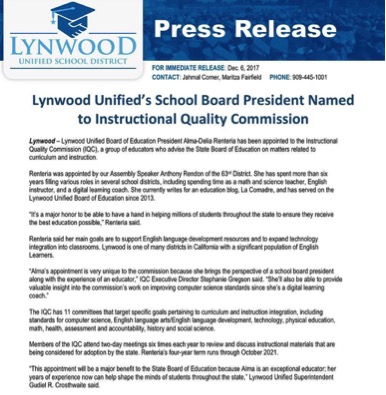Three years ago, I found myself at a League of United Latin American Citizens (LULAC) conference, chaperoning one of my students. From the start of the event, I was engaged as the theme of the event focused on inspiring more women to run for office or seek appointments in order to amplify our voices and experiences and open doors of opportunities for generations to come. Coincidently, the student that I attended with had recently shared her aspirations with me to one day run for office to represent her own community, so being there was a great opportunity for her to get to learn about practical ways to further develop her leadership.
After attending multiple workshops, it was Hispanas Organized for Political Equality (HOPE), a non-profit, non-partisan organization committed to ensuring political and economic parity for Latinas through leadership, advocacy and education that opened our eyes to an array of opportunities available to have an impact on policy at the state level. HOPE’s topic? A workshop around “State Commissions and Boards,” with a clear outline of the process to getting appointed.
Before that day, I was ignorant to the whole concept of State Commissions and Boards. I am not a natural when it comes to politics. I skipped taking political science courses in college and instead focused my time on literature. I learned about campaigns and local government as I ran my first campaign (my own!) and eventually, took office to serve my community. Needless to say, before sitting through HOPE’s workshop, I had no prior knowledge on how State Commissions worked and why they even mattered. But after my own recent appointment to the Instructional Quality Commission, I find myself feeling responsible to share the knowledge as the more of us serve on these boards and commissions, the greater our impact is on state policy.
If you are feeling as uneasy as I did about the whole topic, here is the quick explanation from the University of California, Riverside’s Office of Government and Community Relations:
As a member of a board or commission, you can influence public policy, bring attention to issues that you care about and help others understand why they are important, gain access to policymakers, learn about the political process, and serve as a role model for others in your community.
To get started, here are three simple steps:
- Research and identify boards and commissions that interest you.
Review available State of California board and commission appointment positions. Read through descriptions and be aware of the time requirements for each.
https://www.gov.ca.gov/m_appointments.php
- Select a board or commission that fits you and build your qualifications.
Getting appointed can often be a competitive process. It is important that you brand yourself and convince others that you are the best candidate; if for some reason, you don’t feel like you have the right qualifications, then make a plan to build them up. You can volunteer for local boards/commissions through your city or establish a track record in local affairs through community involvement. Whatever you do, just remember to be intentional.
- Build your support and apply.
Request letters of recommendation from people who may have influence with the appointing authority or from experts that can speak to your qualifications. Once you have your letters of support, complete the online appointments application. You can choose up to 10 positions to apply for on the application; the online application can be found at https://www.gov.ca.gov/s_appointmentsapplication.php.
After applying, it becomes a waiting game. Appointments can sometimes be political as specific issues and other factors such as geographical requirements can influence the decision, so the process can be lengthy. However, it is important that you remain patient and flexible.
So, when is the right time to seek appointment? Now. The sooner you start the process, the sooner you will get on the radar. If there is one lesson I learned through my own appointment process was this: had I waited for the right time, I would have never submitted my application.

